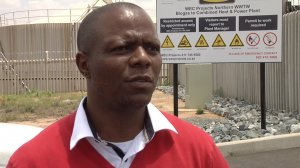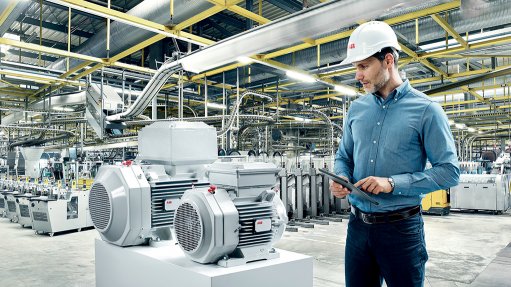Plans under way to grow South Africa's biogas industry

Northern Wastewater Treatment Plant's biogas project engineer Peter Louw discusses the development of a biogas project at one of the City of Johannesburg's wastewater plants. Recorded:22.10.13. Camerawork: Nicholas Boyd. Video editing: Shane Williams.
The successful implementation of a biogas-to-energy plant at the City of Johannesburg's Northern Wastewater Treatment Works (WWTW) has sparked plans to roll out the technology to other energy-intensive wastewater works in South Africa's most populous province.
Since the R38-million biogas operation kicked off with three engine-powered biogas generators, the Diepsloot-based Northern WWTW had replaced 15%, or up to 1.2 MW a day, of its 8.8 MW daily energy requirements.
The Northern WWTW collects and treats mainly domestic sewage from Alexandra, Sandton, Randburg, the northern areas of Johannesburg, Bedfordview and portions of Edenvale and Germiston.
City of Johannesburg project engineer for the biogas initiative Peter Louw commented on a site visit to the plant on Tuesday that the biogas-to-energy plant – a result of years of study and reviews – could save the city millions of rand when expanded with higher powered biogas generators to reach a final plant design of 4.5 MW, supplying 50% to 60% of the energy required to run the treatment plant.
The generators would be installed, following the upgrade of the final four anaerobic digesters, within the next year or two. Four digesters had already been refurbished in 2007 and 2009.
With ever-increasing electricity prices, the wastewater treatment plant needed to cut back on its R100-million-a-year electricity bill, which was expected to rise to over R300-million a year within the next seven to ten years.
The City of Johannesburg was currently implementing similar projects to supply 60% of the required power at the five other wastewater treatment plants under its responsibility, most notably the Bushkoppie Wastewater Treatment plant and the Driefontein Wastewater Treatment plant.
Meanwhile, Southern African Biogas Industry Association (Sabia) chairperson Mark Tiepelt, who unveiled to the media his own small-scale biogas plant at his Muldersdrift home, said the upscaling of the biogas industry in South Africa could stimulate job creation and skills development.
He pointed out that, while the renewable-energy sector could produce 1.9 jobs for every MW installed, the biogas industry could turn into a R10-billion industry, spurring the manufacturing sector with the development of biogas-specific products and services and creating five to ten times the number of jobs that other renewable-energy projects do.
Currently, South Africa had about 300 biogas digesters in operation, compared with Lesotho, which had about 600 government-subsidised digesters in operation.
The biogas industry’s waste, generated from the conversion of the initial organic waste into gas, could further be used as compost for the agricultural sector. The conversion of waste to gas would also deliver added benefits, including the production of thermal heat, the supply of electricity to rural regions out of the reach of State-owned power utility Eskom and effective waste management, while enabling carbon mitigation and easing strain on the national electricity grid.
However, to ensure successful industry development, the country needed to heed the lessons emerging from failed global biogas industry development.
India had rolled out over 12-million digesters, of which only 30% remained operational, with the remainder falling into disuse owing to poor maintenance.
To this end, the Department of Energy, Sabia and the Development Bank of Southern Africa would hold a biogas conference in Midrand, from October 30 to 31, to highlight the potential of the biogas industry, while analysing and developing solutions for potential pitfalls and the failures of other countries.
Comments
Press Office
Announcements
What's On
Subscribe to improve your user experience...
Option 1 (equivalent of R125 a month):
Receive a weekly copy of Creamer Media's Engineering News & Mining Weekly magazine
(print copy for those in South Africa and e-magazine for those outside of South Africa)
Receive daily email newsletters
Access to full search results
Access archive of magazine back copies
Access to Projects in Progress
Access to ONE Research Report of your choice in PDF format
Option 2 (equivalent of R375 a month):
All benefits from Option 1
PLUS
Access to Creamer Media's Research Channel Africa for ALL Research Reports, in PDF format, on various industrial and mining sectors
including Electricity; Water; Energy Transition; Hydrogen; Roads, Rail and Ports; Coal; Gold; Platinum; Battery Metals; etc.
Already a subscriber?
Forgotten your password?
Receive weekly copy of Creamer Media's Engineering News & Mining Weekly magazine (print copy for those in South Africa and e-magazine for those outside of South Africa)
➕
Recieve daily email newsletters
➕
Access to full search results
➕
Access archive of magazine back copies
➕
Access to Projects in Progress
➕
Access to ONE Research Report of your choice in PDF format
RESEARCH CHANNEL AFRICA
R4500 (equivalent of R375 a month)
SUBSCRIBEAll benefits from Option 1
➕
Access to Creamer Media's Research Channel Africa for ALL Research Reports on various industrial and mining sectors, in PDF format, including on:
Electricity
➕
Water
➕
Energy Transition
➕
Hydrogen
➕
Roads, Rail and Ports
➕
Coal
➕
Gold
➕
Platinum
➕
Battery Metals
➕
etc.
Receive all benefits from Option 1 or Option 2 delivered to numerous people at your company
➕
Multiple User names and Passwords for simultaneous log-ins
➕
Intranet integration access to all in your organisation


















